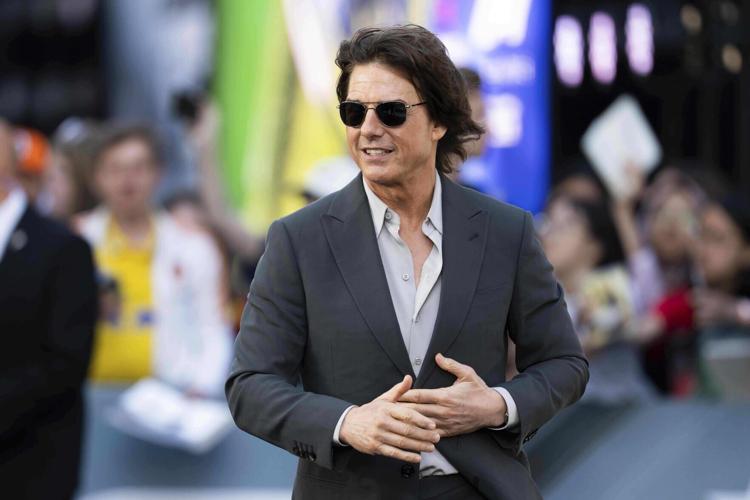COLUMN: Hollywood’s political heroes and villains | Tom Cronin
Politics is a demanding and unsentimental profession. We admire some public servants but can quickly sour on them as well. The mayor of New York had this happen to him. And the current president is getting surprising pushback from once loyal supporters.
We force politicians to be ambitious and competitive, promote themselves, make big promises and then we mock or fault them when something goes wrong and when they fail to live up to our often unrealistic expectations.
Hollywood political movies are often based on or inspired by recent public figures and sometimes satirized supervillains.
Hollywood gives us more scoundrels than heroes, yet it has celebrated notable public servants and gives us fictionalized patriots.
Our nation is based on lofty aspirations — freedom, justice, equality and opportunity — and these ideals are hard to achieve. No wonder we get disappointed and tell pollsters things aren’t going the right way — which has been the case for a few years .
Here are movie personalities that make us proud and patriotic.
Senator Jefferson Smith (acted by Jimmy Stewart) in “Mr. Smith Goes to Washington” is our gold star example of an unforgettable “one good person can make a difference” public servant hero. He successfully fights the politically corrupt and fights for the little guy. And he makes us proud.
Actress Jean Arthur in that same film, for those who watch it carefully, is also a hero. She is Senator Smith’s legislative assistant, and she provides the savvy and “secret sauce” that guides her newbie senator so he can be effective.
Forrest Gump (Tom Hanks) is yet another American hero — athlete, soldier, entrepreneur, exemplary citizen. He personifies the American Dream.
Temporary public defender Atticus Finch (Gregory Peck) in “To Kill a Mockingbird” is a model public citizen stepping forward to try to provide justice in a demanding situation.
This novel turned movie inspired countless individuals to consider going to law school and consider public defender service.
The two-time box office hit “Top Gun” gave us Tom Cruise acting as Pete “Maverick” Mitchell, a Navy fighter pilot who proudly serves his country and dazzles us with air acrobatics.
He is a rogue, a charmer and a showoff — and he and his heroics helped the U.S. Navy recruit thousands of pilots.
Steven Spielberg’s “Lincoln” was a prize-winning film that reminded us of why Abraham Lincoln is, for most of us, our favorite president. Daniel Day-Lewis gave a great performance that instructs political leadership can be challenging and complicated.
Actor Martin Sheen’s performance as fictional progressive president “Jed” Bartlet in “The West Wing” NBC television series showcased public servants trying to solve problems and do good. Conservatives joked it should have been called “The Left Wing,” yet everyone agreed it gave us a White House crew dedicated to responding to serious public interests.
“High Noon” is a favorite of several former presidents and is said to be the most viewed movie at the small theatre in the White House. Actor Gary Cooper plays Marshal Will Kane in a frontier town trying to establish law and order. But he finds it hard, as most politicians frequently do, to rally his community to join him in promoting the common good. He was tempted to walk away — but his example is one of selfless commitment to duty, and he, with some crucial help from his bride, fights villainous thugs who want to take over the town.
Actor Henry Fonda, as Juror No. 8 in “12 Angry Men” gives us another citizen-patriot. He asks probing questions and is the all-American example of a juror who takes his role seriously. He provides the leadership the defense counsel had failed to supply. He was temporarily a pain in the butt for his fellow jurors, but he is our role model for what a citizen-juror should be.
George C. Scott acts as the demanding World War II general in “Patton”. He was tough on his troops, but they loved him and is now viewed as the most effective fighting general in that war.
Special agent Jack Bauer may bend the rules but he provides heroics in his homeland security service in the television series “24”. Sylvester Stallone does the same in his “Rambo” series. Bradley Cooper’s portrayal of Navy SEAL sniper Chris Kyle, nicknamed “the legend” in “American Sniper,” makes us proud of servicemen even if it was in a questionable war. “Captain America” offers us a fictionalized hero soldier.
Community organizer Ruby Archuleta is a feisty civic organizer who makes a difference in her Hispanic hometown along the Rio Grande River in New Mexico. See her in the John Nichols-inspired “The Milagro Beanfield War” and you won’t forget her. Harvey Milk (Sean Penn) is yet another example of civic organizer trying to bring about a more just community in his San Francisco in “Harvey Milk.”
An FBI agent is the good guy in the otherwise depressing story told in Martin Scorsese’s “Killers of the Flower Moon”. A CIA agent (Jessica Chastain) makes things happen in “Zero Dark Thirty”. A U.S. Senate aide is the hero (Adam Driver) in “The Report”. U.S. soldiers are our heroes in many films but especially in “Saving Private Ryan” and “Sergeant York”. A volunteer theoretical physicist is our hero, if he is sometimes troubled about it, in “Oppenheimer.”
And then, Hollywood gives us plenty of villains.
Congressman Frank Underwood, the fictional 11-term representative from South Carolina in the series “House of Cards”, is a prize-wining villain. This sleazebag opportunist tells us that “the road to power is paved with hypocrisy — and casualties,” and “for those of us climbing up the food chain, there can be no mercy.” And we are shocked and dismayed that in later episodes he moves up the political ladder.
U.S. Senator Johnny Iselin and his scheming wife Eleanor in “The Manchurian Candidate” are malicious, double-dealing, treasonous villains. Fictional southern governor Willie Stark (Broderick Crawford) in “All the King’s Men” tells the story of how political power can be intoxicating.
Fictional generals and military advisers in “Dr. Strangelove”, “Seven Days in May” and “Fail-Safe” make us skeptical and worried about some of those in top governmental positions.
Vice President Selina Meyer in “Veep” is a mocking satire of a senior political figure whose hypocrisy, ineptitude and fakery make “Dilbert” of cartoon fame look like a leader.
The movie “Bob Roberts” (Tim Robbins) is one of the best examples of a stinging satirical mockery of a fictional U.S. Senate candidate. Virtually everything this folk-singing libertarian candidate does is depicted as scheming, insincere and phony. It plays right into the popular narrative of politicians as slimy and toxic.
“Casino Jack” is one of the best Hollywood films explaining lobbying and bribery. It is closely based on a lobbyist named Jack Abramoff who was convicted for bribing several members of Congress. He was a legendary wheeler-dealer who represented Native American tribes, the Mariana Islands and a Florida-based casino cruise ship. At least 24 people were convicted as part of his conviction. Most of us don’t understand the expansive world of lobbying influencers, but this film casts a dark light on it.
The theme of power corrupting is presented and explored, in many films, including Orson Welles’ “Citizen Kane”, “All the President’s Men”, “Wag the Dog”, “On the Waterfront” and “The Handmaid’s Tale”. The list goes on and on.
Movies remind us that politicians and people in public life are human. Being in public life can amplify a person’s flaws and weaknesses. As is true in all walks of life, people with great strengths often have great weaknesses as well.
Yes, we should be skeptical of people in public life. Yet politics is the lifeblood of constitutional democracy. Politics matters.
Demeaning politics and politicians have its cost and can be overdone. We have to encourage the future Lincolns, Atticus Finches, Jefferson Smiths, Private Ryans, Will Kanes and Ruby Archeletas to keep on trying to bring about justice, equality and freedom for all.
Tom Cronin is a news columnist who regularly writes on Colorado and national politics and is the co-author of “American politics Film Festival”(2025).







